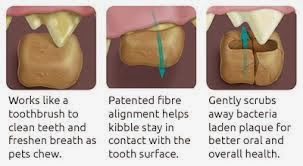Who needs dental care? Anyone with teeth!
According to the American Veterinary Dental College “Periodontal disease is the most common clinical condition in adult dogs and cats, and is entirely preventable. By three years of age, most dogs and cats have some evidence of periodontal disease."
 |
| Some signs of dental disease. |
February is National Pet Dental Healthcare Month and in honor of this we will have a 4 part series on taking care of your kitty's teeth. This week we will go over the most important part of dental care: what you do at home.
Home care starts with brushing. Every day. (Yes, everyday). Brushing your cat's teeth may seem difficult but here are a few tips to get started.
 |
| This is not how to use a toothbrush |
You will need:
A cat. A toothbrush. Toothpaste (optional)
The most important part of brushing the teeth is the manual abrasion of debris from the surface of the tooth. You can use a soft baby toothbrush, a special cat toothbrush, a fingerbrush (my first choice), or a piece of gauze to help you accomplish this.
 |
| Fingerbrushes |
IF YOU GET BIT BY YOUR CAT, SEEK MEDICAL ATTENTION!
Some notes about available dental hygiene products:
 |
| Delicious seafood |
Toothpaste is good for 2 things. First, the taste may make the whole exercise more palatable to your kitty. Second, a good feline toothpaste will include some type of enzymatic cleaner. I like the C.E.T. products. They come in multiple flavors including malt, poultry, vanilla mint and seafood (Yum!)
It is very important to use a pet safe toothpaste! These are designed so that they are safe if ingested (most human toothpaste is toxic when ingested in large amounts--which isn't much when you weigh 10 pounds!)
 Home care also includes things like chew treats. The most well known of these is probably Greenies. I also like CET Chews. Both of these products are designed to be chewed, not gulped. The material of the chewie then "brushes" the tooth as it moves through and through.
Home care also includes things like chew treats. The most well known of these is probably Greenies. I also like CET Chews. Both of these products are designed to be chewed, not gulped. The material of the chewie then "brushes" the tooth as it moves through and through.Another "self brushing" product is Hill's prescription diet t/d formula (t/d = Tartar Diet). As you can see in
the diagram below the fiber matrix of the kibble holds up to the chewing. If t/d is fed exclusively (which I don't recommend due to
 |
| Hill's t/d |
 |
| Hill's t/d |
Low at the end of the list of home care are rinses and gels. You can think of these as mouthwash for cats. They help hold down bacterial levels in mouths but do not remove existing plaque. They can help with mouth odor (halitosis) and may slow down the growth of bacteria that create plaque and tartar.
Finally are the products I like to call "You are probably wasting your money". These include but are not limited to: water additives, breath drops, probiotics specifically for teeth and any product that does not have the VOHC (Veterinary Oral Health Council) seal of approval which can be found on products that have been vetted (hehe) and found to have scientific evidence of effectiveness.
As always, talk to your veterinarian about any concerns about your cat and before undertaking any medical choices! Regular examinations and a good doctor-patient relationship are necessary to a healthy kitty!

No comments:
Post a Comment